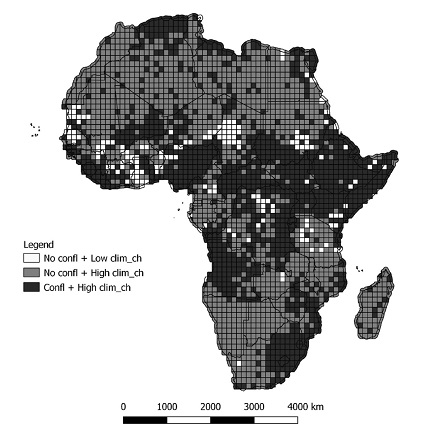Climate change affects the likelihood of armed conflict
Prolonged increases in temperature and rainfall increase the likelihood of conflict beyond the affected area by four to five times
[ 24/06/2022 ]
Climate change influences the likelihood and duration of armed conflicts in Africa. This is the result of a study carried out by a team from the INGENIO Institute, a joint centre of the Universitat Politècnica de València (UPV) and the Consejo Superior de Investigaciones Científicas (CSIC), together with the University of Rome III and the University of Urbino Carlo Bo, published in the latest issue of the journal Economía Política.
The team of researchers based their study on data from the African continent from 1990 to 2016. Using a negative binomial regression mathematical model, they assessed whether certain climatic phenomena, in combination with the socio-economic characteristics of the areas studied, affected the likelihood of a conflict breaking out and, if it did, its duration.
Among its findings, the study states that a prolonged increase in temperature and precipitation increases the probability of conflict beyond the affected area by four to five times, specifically in populations up to a radius of about 550 km.
The study also concludes that, in Africa, food shortages due to drought increase the possibility of conflict, especially if water shortages persist for at least three years. Conversely, excess rainfall triggers conflict, but in a very short period of time.
Implications for adaptative policies
"The results we have obtained have far-reaching implications for territorial policies on the African continent. For example, changes in climatic conditions influence the likelihood of conflict over large areas, which means that the design of climate adaptation policies must consider the particularities of each territory," says Davide Consoli, a researcher at the INGENIO Institute and one of the authors of the study.
The INGENIO, University of Rome and University of Urbino team also points out that the persistence of violence requires the implementation of climate change adaptation strategies designed in combination with peacekeeping measures, especially in those areas most prone to armed conflict.
"These measures are essential in the design and implementation of adaptive strategies for climate resilience. In fact, poorly designed adaptation interventions can exacerbate existing inequalities and increase the risk of conflict," concludes Consoli.
Reference
Cappelli, F., Conigliani, C., Consoli, D. et al. Climate change and armed conflicts in Africa: temporal persistence, non-linear climate impact and geographical spillovers. Econ Polit (2022). https://doi.org/10.1007/s40888-022-00271-x
Outstanding news
 Study a degree at the best technological university in Spain
Study a degree at the best technological university in Spain
The Universitat Politècnica de València is ranked number 1 among Spanish technology universities, according to the Shanghai ranking
 Highly Cited Researchers 2025
Highly Cited Researchers 2025
Avelí Corma, Juan Bisquert and Luis Guanter, the international scientific elite with a Universitat Politècnica de València hallmark
 Historic Milestone in Spanish Higher Education
Historic Milestone in Spanish Higher Education
The UPV inaugurates the Beihang Valencia Polytechnic Institute, the first Spanish university center in China
 Study in English
Study in English
The UPV offers eight degrees, 16 master's and 650 courses in English for the 2025-26 academic year
 A Latin Grammy... with the UPV hallmark
A Latin Grammy... with the UPV hallmark
'Music teaches us to listen and live together,' says Rafael Serrallet, Doctor of Music at the UPV, awarded in Las Vegas as the author of the Best Instrumental Album of 2025
 THE Impact Ranking
THE Impact Ranking
The UPV, the Spanish university with the greatest social and economic impact in the world

